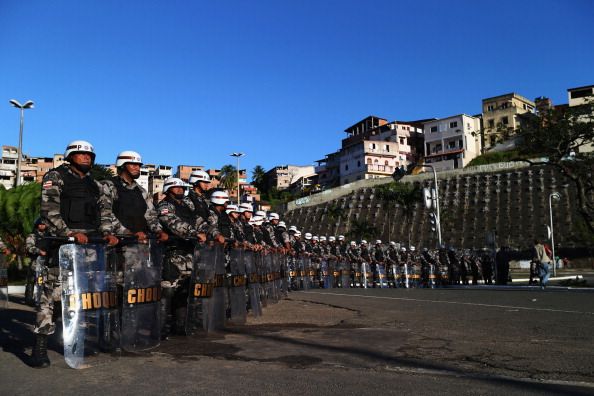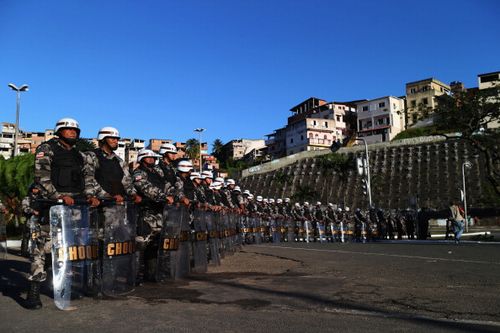
Protests pierce football bubble at Confederations Cup

Heightened security measures due to possible protests ahead of the FIFA Confederations Cup Brazil 2013 Group B match between Nigeria and Uruguay at Estadio Octavio Mangabeira (Arena Fonte Nova Salvador) on June 20, 2013 in Salvador, Brazil. (Getty Images)
The player glances anxiously at the press officer, who furrows his brow. With one press-conference question from a reporter, the Brazil protests crash in on the neatly organised interior life of the Confederations Cup.
“What do you think about the protests?” is not a question to which many of the players at the two-week tournament of continental champions have had to give much thought.
Battles have raged in Brazil this week, fugs of tear gas drifting through the streets as riot police clash with protesters angry at the alleged misallocation of government funds, but the event at the centre of it all remains largely untouched.
On several occasions, demonstrators have attempted to breach the tight security around the competition’s six host stadiums, but on each occasion they have been rebuffed by riot police.
In the midst of it all, the players from the eight competing countries — many of them millionaire superstars — have been ferried around from venue to venue in their team buses, trying to keep as low a profile as possible.
The cosseted stars were initially reluctant to express opinions on the demonstrations, the biggest to hit Brazil in 20 years, only for the host nations’ players to shatter the omerta in the build-up to their game with Mexico on Wednesday.
Dani Alves, David Luiz, Hulk and Fred all spoke out in support of the protesters, before the teams’ poster boy, Neymar, delivered a chastening message to the government, accusing them of neglecting their “obligation” to the Brazilian people.
Prior to Wednesday’s game, 15,000 people marched on the match venue in Fortaleza and the atmosphere inside the stadium was electric.
When the music of the Brazilian national anthem finished playing, players and fans alike sang on regardless, spontaneously forming an a cappella choir of 60,000 people that observers described as “spine-tingling”.
Luiz, the Chelsea defender, said it was “one of the most beautiful moments of my life”.
Thiago Silva, the captain, sang with his eyes tightly closed, his head raised to the sky. Left-back Marcelo revealed that young midfielder Oscar had “tears in his eyes”.
Whether as a direct result or not, others have since added their voices to the chorus of support for the protests.
“I think each person has their reasons for making a protest,” said Uruguay striker Diego Forlan, who plays for Brazilian club Internacional.
“I believe that this is a moment now where everyone is focusing on the World Cup and looking at Brazil, so this is a moment for people to speak up and express their opinions about what is wrong.”
He was echoed by his coach, Oscar Tabarez, who asserted the demonstrators’ “right” to have their voices heard.
In general, however, the tone has been circumspect.
“We keep football apart from politics,” said Nigeria coach Stephen Keshi.
“I don’t think it’s something to take the concentration away from football. In Nigeria we try to keep both separate.”
Mexico coach Jose Manuel de la Torre, meanwhile, said he and his players would “keep our distance from what’s happening”, while declaring that they were “very respectful” of the demonstrators’ motives.
FIFA president Sepp Blatter was unequivocal that there should be no cross-over between the people on the streets and the tournament that has become the focus of their ire.
“I can understand that people are not happy, but they should not use football to make their demands heard,” the president of world football’s governing body told Brazilian television channel Globo earlier this week.
However, the stance taken by the Brazil squad suggests the players are no longer content to countenance the accusation that they have no connection with the fans who flock to see them.
They, too, seem determined to let the world know that, as one demonstrator told AFP, “Brazil is not just the country of football and partying”.